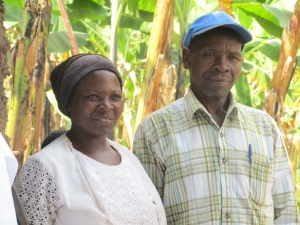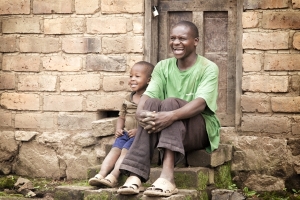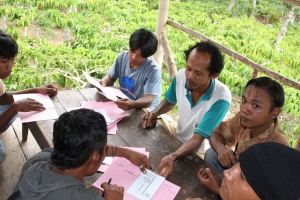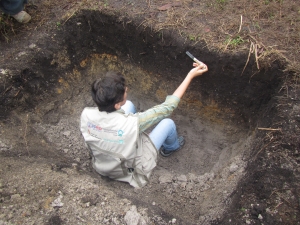At Paulig we want to further the well-being of coffee farmers and protect the environment and natural resources in the countries of origin. In order to be able to do this as well as possible, we have joined forces with four other European family businesses in the coffee industry, forming the non-profit International Coffee Partners (ICP) collective in 2001. Two more members have since joined. The same collective has founded the Coffee & Climate project, which supports adaptation to climate change.
The ICP implements projects that improve the livelihoods and living conditions of smallholder coffee farmers and their families, in various countries of origin. Governments, development organisations and NGOs in these countries are also involved. To date, we have collaborated in 23 projects in 12 different countries and have had the opportunity to positively affect the living conditions of 38,000 coffee farmers. When the families of the farmers are factored in, the projects have improved the lives of nearly 247,000 people.
Currently, there are five active projects underway, which are briefly described below, along with an overview of the situation. More details on the Coffee & Climate project can be found here.
1. We are supporting the cultivation of the Arabica coffee variety in the Rwenzori area in Uganda
The goal of the project, started in 2012, is to improve the livelihoods of the coffee farmers and their families in the Rwenzori area in Uganda, by developing the production of the Arabica variety of coffee so that it is more competitive and adapted to sustainable development.
 The majority of the coffee farmers in the Rwenzori area are smallholder coffee farmers, owning a growing area well under half a hectare. Both the productivity of the farms and the farmers’ incomes are modest. Only 10% of the farmers have set up their own groups, and the farmers have weak relationships with export companies providing marketing and financing support.
The majority of the coffee farmers in the Rwenzori area are smallholder coffee farmers, owning a growing area well under half a hectare. Both the productivity of the farms and the farmers’ incomes are modest. Only 10% of the farmers have set up their own groups, and the farmers have weak relationships with export companies providing marketing and financing support.
The focus areas in the ICP project in Rwenzori are:
-
To be able to create and reinforce relationships between farmers and reinforce their connections to the Uganda coffee farmers union.
-
To be able to help the farmers to adapt to the challenges brought on by climate change, by teaching them new, production-boosting cultivation methods.
-
To improve the quality of the coffee by improving the post-processing method of the coffee berries after harvesting.
-
To improve the sales of the smallholder farmers by forming farmer collectives, which shorten the supply chain and enable joint marketing, thereby reducing the overall costs of the farmers.
-
To improve gender equality by unleashing the latent potential in women, for the benefit of the entire farmer collective.
To date, more than 10,000 farmers in the Rwenzori area have been trained in the new cultivation practices, strengthening their bonds with each other, and they are now actively sharing their learned craft with other farmers. Additionally, 3,000 households have participated in couples seminars, resulting in 170 married couples becoming agents of change to further gender equality in their communities.
2. We are supporting the usage of sustainable cultivation methods in Trifinio
The main source of income in the Trifinio area, which is known for its biodiversity, is coffee cultivation, and the farmers, in fact, play a key role in protecting the environment. Coffee trees cover enormous areas in Trifinio and a large number of animal species and plants live and grow protected by these trees. Coffee trees are also a good method of combating topsoil erosion. Trifinio is located in Central America in three countries: El Salvador, Guatemala and Honduras.

Despite the large financial and ecological significance of coffee, coffee cultivation has not been taken full advantage of. The income level of farmers is very low, the land usage is ineffective and the farmers have started to encroach on the protected forests of the area. A lot of intermediaries are also involved in the coffee industry in the area, taking their own cut of the already small income of the farmers.
The ICP project started in Trifinio during 2014 is aimed at improving the living conditions of 4,000 farmers and their families by the year 2017, by helping farmers become organised and by reducing intermediaries. Farmers are also aided in the implementation of sustainable growing principles, to avoid endangering the diversity of the wildlife in the area. Simultaneously, coffee cultivation will become more profitable.
3. We are helping to raise the Tanzanian coffee farmers’ income above the poverty line
The goal of the project, started as early as 2010, is to make the production processes of coffee so effective that the income levels of the 25,000 farmers and their families can be raised above the poverty line. Results have already been achieved in southern Tanzania, with the work now continuing in northern Tanzania.

In Tanzania, the profitability of small coffee farms is weak and insufficient to safeguard the livelihoods of coffee farmers or to develop investment. Specific challenges are created by climate change, the disappearance of nutrients from the soil as well as the lack of specific know-how required for the production of quality coffee and its professional trading. Solutions to these challenges are being sought in the ICP project in Tanzania.
The ICP project helps farmers to form well-managed commercial organisations, which are owned by the farmers themselves and which offer services aimed at improving cultivation and increasing coffee sales for their members. By embracing the improved cultivation practices, the productivity of the small farms can increase by 60%, from 250 kilos to 400 kilos per hectare. The change becomes permanent when the farmers themselves take an active role in achieving it.
4. We are strengthening the operational models of the smallholder farmers of the Robusta variety in Indonesia
The goal of the project, started in 2013, is to improve the profitability of farmers performing small-scale cultivation of Robusta, and to adjust the farmers’ cultivation practices to the climate changes.

Although Indonesia has three times the area for cultivating coffee that Vietnam has, and more plentiful natural resources, Indonesia only produces 40% of Vietnam’s annual amount of coffee production. An estimated 5 million coffee farmers could significantly improve their living conditions if they had the opportunity to learn good cultivation practices and had the opportunity to market their coffee in a more organised manner.
Indonesia is the fourth-largest coffee producer in the world. Despite their long history of coffee production, Indonesian coffee farmers need to increase the effectiveness of their practices and their limited understanding of coffee quality. The planting density of the coffee trees is often not ideal and many trees have become old, which diminishes their crops. No attempts are made to adapt to climate change, and the continuation of old cultivation methods leads to a weakening of the coffee quality and a decrease in the productivity of the plants.
To date, 21 farmer collectives have established a shared savings and credit programme, and 15 collectives have selected a marketing manager from their midst to further the consumption of the collective’s coffee. Thanks to these new organisation structures, the farmer collectives have together succeeded to market 100 million tonnes of coffee to Bandar Lamping, which is a 10-hour drive from the growing areas. Now that the farmers have been trained to invest in the quality of the coffee, and their shared efforts have granted them access to larger markets, they no longer have to sell their coffee to local intermediaries who pay a lower price. The number of collectives is steadily growing.
5. We support smallholder coffee farmers in Peru in becoming organised
The World Bank has classified Peru as an upper-middle-income nation, and the UN has given Peru a high grade in the Human Development Index. These classifications are based the fact that the economy has grown every year by over 8% since 2005. Despite these impressive economic growth figures, there is considerable poverty and inequality, especially in the countryside. For this reason, the ICP started a project in 2010 to improve the living conditions of smallholder coffee farmers in the northern parts of Peru.
In northern Peru, coffee farming was started at a rather late stage. Many farmers have moved to the area through relocation programmes to encourage people to start cultivating coffee. Unfortunately, challenges have arisen in contrast to these great opportunities. There is not much organisational activity in Peru’s coffee industry and farmers do not have any technical or financial support. For this reason, the productivity of coffee farming and income levels are low, and farmers have a weak relationship with the market.
An estimated 70% of Peru’s coffee farmers do not belong to a farmer collective and on their own they are rather helpless. In its Peruvian project, the ICP is focused on creating development programmes for farmers, and specifically constructing farmer collectives to further business activities. The members of the collective are trained in good cultivation practices until they can support each other and independently develop these practices. The goal was to get 1,000 farmer families involved in the project. In the June of 2015, the goal was surpassed. Through the project, more than 4,500 farmers and their family members have been able to improve their living conditions.
